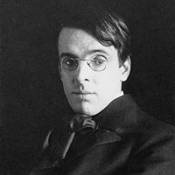
William Butler Yeats
Playwright
Biography
William Butler Yeats
William Butler Yeats was born in Dublin. His father was a lawyer and subsequently a well-known portrait painter, and his mother was the daughter of a wealthy merchant. When Yeats was two, the family moved to London and he was educated there until the family moved back to Dublin during his teenage years. He spent his summers in the west of Ireland in the family’s summer home at Connaught.
As a young man, he was a part of the fin de siècle in London and also became increasingly active in societies seeking to revive Irish literature. His first volume of verse was published in 1887, but as a young man he favored drama over poetry. Along with Lady Gregory he founded the Irish Theatre, which subsequently became the Abbey Theatre. His early plays, such as The Countess Cathleen, The King’s Threshold, and Deidre were based on Irish folklore and reflected his interest in mysticism and spiritualism.
After 1910, Yeats’s plays took on a more experimental form, often using dance, masks, and music, and highly influenced by Japanese Noh drama. During the 1920s, Yeats wrote several hugely influential volumes of poetry, including The Wild Swans at Coole, The Tower, and The Winding Stair and Other Poems (1933). Awarded the Nobel Prize for Literature in 1923, Yeats became renowned as one of the most influential twentieth-century poets writing in English.
Yeats was an Irish nationalist yet he grew increasingly disillusioned with the threat of ‘mob rule’ and the intense guerilla war for independence. He distanced himself from politics until 1922 when he became a Senator for the Irish Free State.
After a complicated and long-standing relationship with Maud Gonne, an Irish patriot and founder of Sinn Féin, Yeats married Miss George Hyde-Lees in 1917 at the age of 52 (she was then 25). They had a daughter, Anne Butler Yeats (1919) and a son, William Michael Yeats (1921). Yeats died in 1939 while traveling abroad and was initially buried in France. In 1948, his body was reburied in County Sligo, Ireland.
Shows
Shows associated with William Butler Yeats
Monologues
Monologues from shows associated with William Butler Yeats
Scenes
Scenes from shows associated with William Butler Yeats
Quizzes
Quizzes associated with William Butler Yeats
Learning Modules
Learning modules associated with William Butler Yeats
Additional Information
N/A